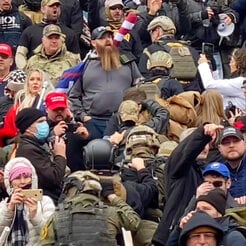Experts studying violent, extremist organizations warned that even if the number of veterans and military members who participate in such groups is small, they can still be very dangerous to the country.
“Extremist ideas and groups cannot be left to operate unchecked within the very organizations charged with protecting the population, including its most vulnerable citizens,” said Cynthia Miller-Idriss, director of the Polarization and Extremism Research & Innovation Lab at American University.
“The future of multicultural democracy from extremism in the military and the veterans communities must be treated like the threat to national security that it is.”
The comments came at a House Veterans’ Affairs Committee hearing on Wednesday on the targeting of veterans by extremist groups, an issue that drew national headlines after a significant percentage of rioters involved in the Jan. 6 attack on the Capitol Building were found to have military experience.
RELATED

Democratic organizers said the goal of the hearing (originally scheduled for earlier this summer) was to look at long-standing problems within the veterans community with violent or anti-government ideologies, not to focus on the aftermath of the 2020 presidential election.
But Republican lawmakers questioned that intent, accusing Democrats of trying to paint all veterans as radicals and criminalize certain political views.
“Free speech must be protected,” said committee ranking member Mike Bost, R-Ill. “It is every veteran’s right to have an opinion – even one I find radical. However, if that opinion is acted on with violence, it is another thing altogether.
“Violence cannot be tolerated, it is undemocratic and anti-American.”
Witnesses at the hearing said the only way to settle the distinction between unpopular views and violent intentions is to focus more closely on the problem.
A recent survey by Iraq and Afghanistan Veterans of America officials found that about one-third of their members personally witnessed extremism in the military ranks. A separate report from the Anti-Defamation League found that at least 133 individuals used military email accounts to participate in events with the Oath Keepers, an anti-government group.
“The question is not whether domestic violent extremist groups are recruiting and organizing veterans to commit violence. We already know this to be true,” said retired Marine Corps Lt. Col. Joe Plenzler, who has researched the issue of extremism for years.
“The questions are how extensive the problem is, and what we are going to do about it.”
He referenced individuals such as Marine Corps veteran Lee Harvey Oswald, who assasinated President John F. Kennedy, and Army veteran Timothy McVeigh, who killed 168 people in the 1995 Oklahoma City bombing, as veterans who used their military skills to cause harm to the entire nation.
Several lawmakers pushed for more data on the pervasiveness of the problem. Defense Department officials have already begun investigations into the issue within the military ranks, but Veterans Affairs officials have not announced similar initiatives.
Witnesses said combating the extremist views will require involvement not just from federal resources, but from veterans service groups and community organizations as well.
RELATED

“These extremist groups recruit veterans because they believe their combat experience, weapons training and leadership skills add credibility and authenticity to their operation,” said. Rep. Raul Ruiz, D-Calif. “We need to understand that these factors are some of the reasons that extremist groups recruit veterans.”
Over Republican objections, the committee is planning follow-up hearings on the issue of extremism in coming months. Chairman Mark Takano, D-Calif., said those events will focus on specific recruiting methods and resources for veterans to avoid being victimized by the groups.
“We are not here to condemn or vilify any veterans engaged with these groups, but rather to draw attention to what these groups actually represent and to highlight the lurking threat posed by these groups,” he said.
“Only by understanding who these groups are, what they believe, and what violent or illegal activities they encourage from their members, can we begin to assess our ability to intervene and to help these veterans and their families reclaim their lives.”
Leo covers Congress, Veterans Affairs and the White House for Military Times. He has covered Washington, D.C. since 2004, focusing on military personnel and veterans policies. His work has earned numerous honors, including a 2009 Polk award, a 2010 National Headliner Award, the IAVA Leadership in Journalism award and the VFW News Media award.





